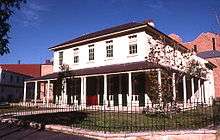Royal College of Pathologists of Australasia

The Royal College of Pathologists of Australasia is a medical organization that promotes the science and practice of pathology. It has members in Australia, New Zealand, Hong Kong, Singapore, Malaysia, and Saudi Arabia.
The object of the College is:
To promote the study of the science and practice of Pathology in relation to medicine; to encourage research in pathology and ancillary sciences, to bring together pathologists for their common benefit and for scientific discussions and demonstrations; and to disseminate knowledge of the principles and practice of pathology in relation to medicine by such means as may be thought fit.
History

The College of Pathologists of Australia was incorporated on 10 April 1956. In 1970, the College was granted Royal assent, and became the Royal College of Pathologists of Australia. With the increasing number of Fellows in New Zealand, the College changed its name to the Royal College of Pathologists of Australasia in January 1980. Since 1986, the College has occupied Durham Hall, a heritage listed building in Sydney's Surry Hills.
Programmes
Training and examinations
The College conducts training and examinations in several sub-disciplines, including:
- Anatomical Pathology
- Chemical Pathology
- Forensic Pathology
- General Pathology
- Genetics
- Haematology
- Immunopathology
- Microbiology
The College accredits laboratories for training, approves supervised training in accredicted laboratories, and conducts examinations leading to Fellowship of the College (FRCPA).
Continuing Professional Development
Since its inception, the College has contributed to the continual development of knowledge and skills of it Fellows, and has established a formal Continuing Professional Development Program.
Professional Practice Standards
The College collaborated with the Commonwealth Government to establish the National Pathology Accreditation Advisory Council (NPAAC) in 1979. NPAAC advises the Commonwealth, State and Territory Health Ministers on matters relating to the accreditation of pathology laboratories, plays a key role in ensuring the quality of Australian pathology services and is responsible for the development and maintenance of standards and guidelines for pathology practices.
While NPAAC provides the standards for laboratory practice, the actual accreditation process is carried out by NATA/RCPA, a joint initiative between the College and the National Association of Testing Authorities (NATA).